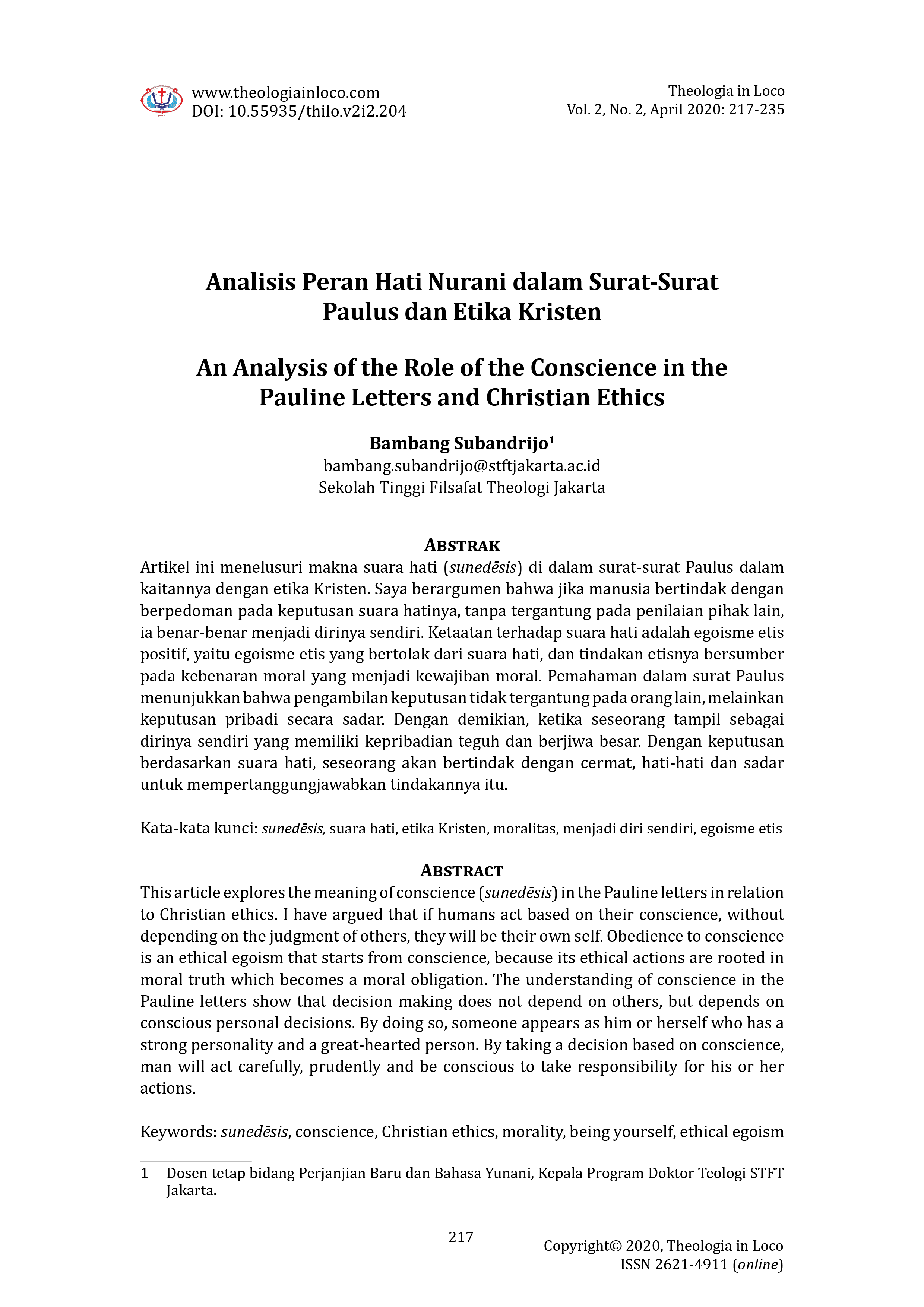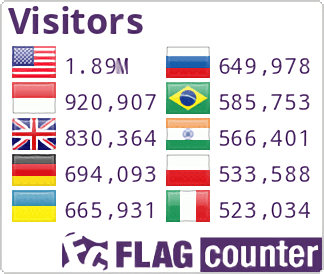An Analysis of the Role of the Conscience in the Pauline Letters and Christian Ethics
DOI:
https://doi.org/10.55935/thilo.v2i2.204Keywords:
sunedēsis, conscience, Christian ethics, morality, being yourself, ethical egoism, Pauline LettersAbstract
This article explores the meaning of conscience (sunedēsis) in the Pauline letters in relation to Christian ethics. I have argued that if humans act based on their conscience, without depending on the judgment of others, they will be their own self. Obedience to conscience is an ethical egoism that starts from conscience, because its ethical actions are rooted in moral truth which becomes a moral obligation. The understanding of conscience in the Pauline letters show that decision making does not depend on others, but depends on conscious personal decisions. By doing so, someone appears as him or herself who has a strong personality and a great-hearted person. By taking a decision based on conscience, man will act carefully, prudently and be conscious to take responsibility for his or her actions.
Downloads
References
Calvin, Jean. Institutes of the Christian Religion. Philadelphia: Westminster Press, 1936.
Chang, William. Pengantar Teologi Moral. Yogyakarta: Kanisius, 2001.
Childs, James M. Ethics in the Community of Promise: Faith, Formation, and Decision. Minneapolis, MN: Augsburg Fortress, 2006.
Curran, Charles E. Critical Concerns in Moral Theology. Notre Dame, IN: University of Notre Dame Press, 1984.
Drewes, B. F., Wilfrid Haubeck, dan Heinrich von Siebenthal. Kunci Bahasa Yunani Perjanjian Baru: Surat Roma hingga Kitab Wahyu. Jakarta: BPK Gunung Mulia, 2006.
Ekstrom, Laura Waddell. Free Will: A Philosophical Study. New York, London: Roudledge, 2000.
Flanagan, Owen. It Takes a Metaphysics: Raising Virtuous Buddhists. Dalam Cultivating Virtue: Perspectives from Philosophy, Theology, and Psychology, peny. Nancy E. Snow, 171-196. Oxford: Oxford University Press, 2015.
Freud, Sigmund. New Introductory Lectures on Psychoanalysis. New York, NY: Norton, 1938.
Hakh, Samuel Benyamin. Akal Budi dan Hati Nurani. Bandung: Bina Media Informasi, 2014.
Kohlberg, Lawrence. Tahap-tahap Perkembangan Moral. Yogyakarta: Kanisius, 1995.
Lehmann, Paul Louis. Ethics in a Christian Context. Library of theological ethics. New York, NY: Harper & Row, 1963.
Magnis-Suseno, Franz. Etika Dasar: Masalah-Masalah Pokok Filsafat Moral. Yogyakarta: Kanisius, 2006.
Mele, Alfred R. Free Will and Luck. Oxford: Oxford University Press, 2008.
Montague, Michelle. Evaluative Phenomenology. Dalam Emotion and Value, peny. Sabine Roeser dan Cain Todd, 32-51. Oxford: Oxford University Press, 2014.
Nullens, Patrick, and Ronald T. Michener. The Matrix of Christian Ethics: Integrating Philosophy and Moral Theology in a Postmodern Context. Downers Grove, IL: InterVarsity Press, 2010.
Ogien, Ruwen. Human Kindness and the Smell of Warm Croissants: An Introduction to Ethics. Terj. Martin Thom. New York: Columbia University Press, 2015.
Pakpahan, Binsar J. The Power of Shame: Mengembalikan Malu Spiritual (Jakarta: UPI STT Jakarta bekerjasama dengan BPK GM, 2016)
Schinkel, Anders. Conscience and Conscientious Objection. Amsterdam: Pallas Publications, 2007.
Svavarsdóttir, Sigrún. How Do Moral Judgments Motivate? Dalam Contemporary Debates in Moral Theory, peny. James Dreier, 163-181. Malden, MA: Blackwell Publishing, 2006. https://doi.org/10.5840/teachphil200730144.
Verkuyl, Johannes. Etika Kristen Bagian Umum. Diterjemahkan oleh Soegiarto. Jakarta: BPK Gunung Mulia, 1979.

Additional Files
Published
How to Cite
Issue
Section
License
Copyright (c) 2020 Theologia in Loco

This work is licensed under a Creative Commons Attribution-NonCommercial 4.0 International License.
The author retains copyright and also agrees to grant Theologia in Loco the right of first publication with the work simultaneously licensed under CC Attribution-NonCommercial-ShareAlike 4.0.






